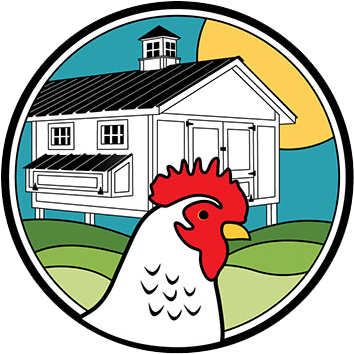Deep Litter Beds
All of our chicken coops come with a deep litter bed allowing you to use the deep litter method with your chickens. Each deep litter bed is now made with Acre™. Acre is a sustainable product that is just like wood, only better. It’s water, weather, and pest resistant. The deep litter system makes it so you only have to clean out your henhouse just once a year! Many wait even longer.
What is the Deep Litter Method?
The deep litter method is a way of composting in your henhouse by letting the litter and chicken droppings build up over time. This not only makes things easier for you, the chicken keeper, but also makes it healthier for your flock.
We recommend starting with a layer of our industrial hemp since it the most absorbent animal bedding around and has little dust. (you can also use pine shavings).
Instead of cleaning it all out every week or so and replacing it when the poop accumulates, you simply stirs up the bedding a bit with a light rake and sprinkle another layer of bedding on top once you start to smell the droppings. You can also throw scratch grains on there to encourage your chickens to break it up.
Your goal is to get a good balance of carbon (the hemp or pine shavings) and nitrogen (chicken droppings) to create a good environment for beneficial microbes to do their job.
By not removing the waste, beneficial microbes come and make their homes in the litter. These microbes actually eat and break down the feces and consume unhealthy bacteria, leaving good bacteria behind. The microbes also help prevent infestations of lice and mites in your flock. (They won’t clean off a bird already infested — use wood ash on infested birds — but can help prevent new infestations from occurring.)
Ewwww! Doesn’t that stink?
Nope – not if it’s done properly (and you don’t overload your henhouse with chickens).
Our industrial hemp bedding is the most absorbent animal bedding on the market, absorbing 4x its weight, and it’s at least twice as absorbent as pine shavings or straw. Our hemp decomposes faster and is less acidic than pine shavings or pellets.
While dirt floors are great for the deep litter method (DLM), it can be done on almost any solid surface at all. Wood will naturally absorb and wick away any moisture from the deep litter bed, which is what you don’t want.
Composting needs some moisture to process as it does. The wood will also deteriorate slowly from this moisture. This is why we now use Acre™, it keeps moisture in the DLM, it will not rot from moisture, it is extremely easy to clean, and it is food safe!
How the Deep Litter Method Was Born
Back in old days, when men went off to fight in wars, women were left to tend to everything. The chicken coop was not a high priority to clean and the goal was simply to keep it habitable.
So instead of cleaning out the henhouses, they would cover the floors with fresh substrate (organic matter) to get by until they could do a thorough clean out.
Over time, they realized that there was no pungent smell, the hens were healthy, it was a natural heat source in the winter, and the heap on the floor had composted into a nutrient-rich fertilizer ready for the garden.
That’s how the deep litter method was born and it’s still widely used today.
Rich Compost for Your Garden
Most people will clean out their henhouse about once a year. Many wait even longer. We recommend leaving about an inch or two layer of the old stuff behind to help the new litter break down faster.
Surprisingly your coop will smell more earthy and natural. If done properly in a well-ventilated coop, there should be no ammonia or ‘fowl’ smell. (sorry, couldn’t resist)
Our chicken coops are not only equipped with Acre™ deep litter beds (that are 12” deep), but they also have a drop down deep litter gate. This is at the perfect height for putting a wheel barrow next to the coop. With a pulling and sweeping motion, you can easily empty the litter into the wheel barrow and bring it anywhere in your garden.
We also recommend letting this nitrogen rich compost cure for a few weeks before using everywhere in the garden.
Important points:
- Stir up the bedding to break up any clumps every so often.
- Don’t ever use diatomaceous earth (DE) or any other chemical insecticide in the coop bedding! This will kill off the beneficial microbes and nematodes.
- Remember: the beneficial microbes can help prevent infestations of mites and lice in your flock.
- Keep layering clean bedding on top of the old bedding.
- Clean out most (but not all) of the bedding once a year or every other year, depending on your flock – most do this in early spring or late fall and use the compost in their gardens.

